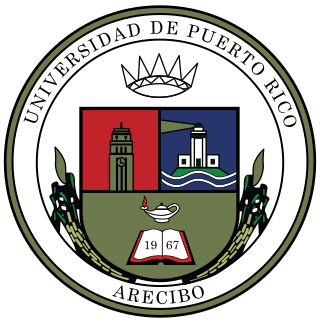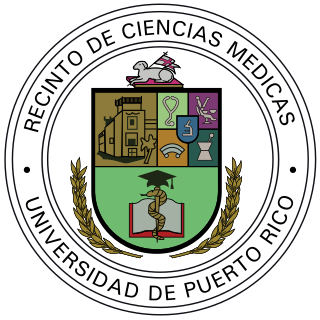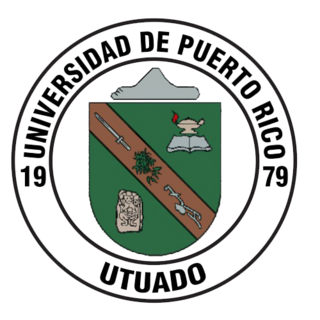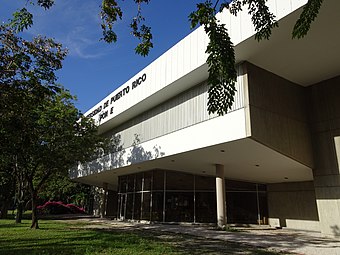
The University of Puerto Rico is the main public university system in the U.S. Commonwealth of Puerto Rico. It is a government-owned corporation with 11 campuses and approximately 44,200 students and approximately 4,450 faculty members. UPR has the largest and most diverse academic offerings in the commonwealth, with 472 academic programs of which 32 lead to a doctorate.

The University of Puerto Rico, Mayagüez Campus (UPRM) or Recinto Universitario de Mayagüez (RUM) in Spanish, is a public land-grant university in Mayagüez, Puerto Rico. UPRM is the second-largest university campus of the University of Puerto Rico system. In addition to its status as a land-grant university, it is also a member of the sea-grant and space-grant research consortia. In 2009, the campus population was composed of 12,108 students, 1,924 regular staff members, and 1,037 members of the education staff. In 2013, the student population remained relatively steady at 11,838, but the instructional faculty dropped to 684. In the second semester of 2019 around 12,166 students were enrolled. By the end of the academic year 2022-2023 there were 10,071 students enrolled. UPRM has been accredited by the Middle States Commission on Higher Education (MSCHE) since 1946.

The University of Puerto Rico, Río Piedras Campus is a public land-grant research university in San Juan, Puerto Rico. It is the largest campus in the University of Puerto Rico system in terms of student population and it was Puerto Rico's first public university campus.

The University of Puerto Rico at Arecibo is a public college in Arecibo, Puerto Rico. It is part of the University of Puerto Rico. UPR-Arecibo was previously the Colegio Regional de Arecibo and Colegio Universitario Tecnológico de Arecibo.

The University of Puerto Rico, Medical Sciences Campus — Universidad de Puerto Rico, Recinto de Ciencias Médicas (UPR-RCM) in Spanish— is a public health sciences-oriented university in San Juan, Puerto Rico. It is part of the University of Puerto Rico System and is located on the grounds of the Puerto Rico Medical Center.

The University of Puerto Rico at Carolina is a public college in Carolina, Puerto Rico. It is part of the University of Puerto Rico (UPR) and is better known as CRCA or CUNICA from its former names in Spanish of Colegio Regional de Carolina and Colegio Universitario de Carolina respectively.

The University of Puerto Rico at Utuado is a public college in Utuado, Puerto Rico. Founded in 1979, it is the youngest of the campuses that compose the University of Puerto Rico system. UPR-Utuado is also known by its previous name Colegio Regional de la Montaña and its acronym "CORMO".

Jaime Benítez Rexach was a Puerto Rican author, academic and politician. He was the longest serving chancellor and the first president of the University of Puerto Rico.

The Pontifical Catholic University of Puerto Rico is a private Roman Catholic university with its main campus in Ponce, Puerto Rico. It provides courses leading to Bachelor's, Master's and Doctorate degrees in education, business administration, the sciences, and arts and humanities. It also has campuses in Arecibo and Mayagüez, as well as a satellite extension in Coamo. It is also home to a School of Law and a School of Architecture. The university also founded a medical school, Escuela de Medicina de Ponce, in 1977, but in 1980 became an independent entity that eventually became the Ponce Health Sciences University.

Blas Oliveras Mercado was a Puerto Rican politician and Mayor of Ponce, Puerto Rico, from 1933 to 1937.

Francisco Parra Capó was a Puerto Rican attorney, politician, and Mayor of Ponce, Puerto Rico, from 1921 to 1923.

Guillermo Vivas Valdivieso was a Puerto Rican attorney, journalist, politician and Mayor of Ponce, Puerto Rico from 1925 to 1928.

Ponce Cement, Inc. was a cement and limestone manufacturer in Ponce, Puerto Rico. The company was located at the intersection of PR-123 and PR-500, in Barrio Magueyes. It was founded in 1941 by Antonio Ferré Bacallao, a Puerto Rican industrialist of Cuban origin. In 1963, the company became the first Puerto Rican company to go public and be listed in the New York Stock Exchange.
The 2010–2011 University of Puerto Rico strikes (UPR) refer to the student strikes which took place between May 2010 and June 2010 in ten of the university system's eleven constituent institutions, as well as the protests that occurred from October 2010 to February 2011.
Luis Porrata-Doría Martin was Mayor of Ponce, Puerto Rico from 11 November 1898 to 12 September 1899. He is best remembered for his forced resignation as mayor following his municipal government's poor response to the catastrophic Category 5 San Ciriaco hurricane that occurred during his administration.
The Justas de Atletismo y Festival Deportivo de Puerto Rico —better known as Las Justas Intercolegiales or simply as Las Justas — is an intercollegiate sports competition held annually in Puerto Rico where Puerto Rican colleges and universities compete against each other in different sports. The event is sponsored by the Liga Atlética Interuniversitaria de Puerto Rico (LAI). The event usually include competitions in softball, basketball, beach volleyball, judo, table tennis, swimming, cheerleading, women's football, and athletics.
The following is a timeline of the history of the city of Ponce, Puerto Rico.
















